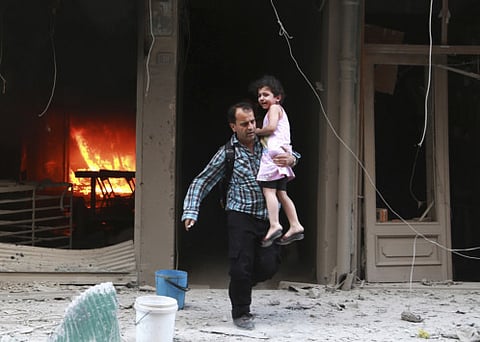‘The tragedy of the Arabs’? Really?
Arab history is subjugated to the vagaries of internal and external pressures

One of the world’s leading weekly news magazines, the Economist, delivered a devastating appraisal this week in an essay titled ‘Tethered by History’, accompanied by a leading editorial — “The Tragedy of the Arabs” — that was even more damaging. It claimed that a civilisation that used to lead the world lay in ruins, and though it acknowledged that only indigenous populations can “rebuild it”, the paper was not particularly optimistic. Although much was covered in the four and-a-half pages of tightly written text — a widely admired Economist speciality — the anonymous writer(s) concentrated on three main themes for their observed decline: Islam, dictatorial rule and poverty.
“Islam, or at least modern reinterpretations of it, is at the core of some of the Arabs’ deep troubles,” the editorial affirmed, because no separation of mosque and state existed that, in turn, allegedly stunted “the development of independent political institutions”. Of course, western societies benefitted from nearly 500 years of post-Renaissance transformations that separated church from state, though it may be useful to note that the overall price paid for this deliverance was in millions of deaths. In comparison, it was safe to opine that if Muslim extremists like Abu Bakr Al Baghdadi wished to create an unrecognisable caliphate through what appears to be a carefully woven and masterfully managed undertaking, their behaviour paled in comparison to the Spanish inquisition or the torture of many over the centuries.
Today, a tiny minority of Muslims who feel abandoned and hopeless fall back on a skewed interpretation of jihad to export terrorism, though their relative successes — 9/11, 3/11, etc — do not fundamentally threaten anyone. Modern terrorism is flashy and causes serious damage but it does not, and indeed cannot, alter existing political institutions and systems of government. Much like their western counterparts, Muslims in general and Arabs in particular have adopted and adapted to the post-Westphalia nation-state system and neither Ayman Al Zawahiri nor Al Baghdadi can change that fact.
Overall impatience
Of course, there are fanatics who interpret the Quran at will and outside of established scholarly circles, which results in the kind of sectarian disasters that now envelop Syria and Iraq. In time, however, Syrians and Iraqis, among others, and Sunnis and Shiites more broadly, will invent the necessary mechanisms to co-exist in peace just like Catholics and Protestants have in several western countries to stop perverted interpretations of Christianity. What is regrettable is the overall impatience that most display towards Arabs, who only gained some independence less than 75 years ago, though other societies endured transformations that lasted centuries. Still worse is the dismissal of the 2011 Arab Spring as a failed phenomenon, when epochal changes sometimes require more than three years.
Critics point out that the early enthusiasm that accompanied radical calls for change in Tunisia, Libya, Egypt, Yemen and elsewhere was quickly replaced by new dictatorial regimes, though most overlooked the repercussions of foreign invasions. It may well be fair to assert that few, if any, Arab governments facilitated democratisation or encouraged the creation of wealth though rentier states in the Gulf region bucked the trend. One sincerely doubted whether jihadists could do better. Perhaps the best illustration of this was the tenure of the Muslim Brotherhood in Egypt under president Mohammad Mursi when Cairo abandoned the masses faster than any military dictator ever did. To be sure, prosperity and democratisation were twin phenomena that travelled together, although what truly prevented both in most Arab countries until very recently was minimal education.
What distinguished the 20th Century was the rise of major western military powers that developed sophisticated contacts with elite populations everywhere (especially in Latin America, Africa, Asia and the Middle East), with the specific purpose of conducting the business of power within small circles, precisely to harness natural resources and create ideal markets for manufactured goods. Military support came in handy that gave rise to outright dictatorships that, in turn, earned their keep.
Save for the rarest officer-citizen, who understood that long-term stability required economic prosperity, Arab societies suffered from a paucity of such leaders — most of whom sought refuge in the creation of fear as a tool of power. Only paternalistic monarchies shied away from such enthusiasm though they were caught in tribal restrictions that prevented — until very recently — the creation of wealth. To their credit, Arab monarchies pushed hard to alter existing conditions that promised to change how relatively small populations could evolve, even if most realised that the process would take a little longer. Elsewhere, poverty dominated, and it was up to ordinary men and women to invest in themselves and in their nations to reform existing institutions.
Arab history is not poisoned, but subjugated to the vagaries of internal as well as external pressures. Mercifully, a vast majority believed that genuine reforms were possible, even if realism dictated that hope be balanced with patience. It took more than a millennia for western societies to mature into democratising entities and some will argue that they are merely “work-in-progress”. Surely, Arabs can take a few years to sort out existential dilemmas without being told that their history is a tragedy.
Dr Joseph A. Kechichian is the author of Legal and Political Reforms in Saudi Arabia (London: Routledge, 2013).
Sign up for the Daily Briefing
Get the latest news and updates straight to your inbox



